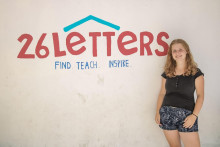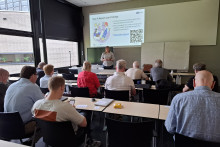Why did you decide to travel to Lebanon?
‘The idea to go to Lebanon hasn’t been plucked out of thin air for me. I think it is now almost two years ago that I saw posters advertising the Nour Project. It stated something about bridging the gap between the Arab and the Western world and that you could go to an Arab country to do a voluntary project. Since I really like travelling and am really interested in discovering cultures and countries that are not really well-known or well-understood, I was drawn to this opportunity. I discovered that I couldn’t fit the project in my holiday. So I decided to join the AIESEC board that organizes this project instead.’
‘It was during this board year that I discovered that this specific project was not easy to advertise, mostly because of fears and prejudices that are associated with the MENA (Middle east and north Africa) region. Therefore I joined the project myself to see if the prejudice are actually right. I chose Lebanon because of the project here, 26 letters, which focuses on changing the reality of children that are bound by economic and geo-political situations. The project tries to achieve that by giving these children the opportunity to learn English.’
How are you adapting to the country? Are there any things you did not anticipate?
‘When I arrived I had to acclimatise to the climate, the temperatures here always range around the thirty degrees, even at night. The city of Beirut is different from any city I have been to before. It is a chaotic city with many sides and many different religions. Now that I have been here for a while I can only recall one incident when I felt a bit unsafe. I am now used to the fact that taxi drivers honk at you all the time, at first I did not know why all the cars honked at me.’
‘What I didn’t anticipate is that Beirut is actually a really western and modern city. Also, the fact that there are so many different religions means that you can actually walk around in your shorts if you want. This is because, unlike other mostly Islamic countries in the Middle-East, around 40% of the inhabitants of Lebanon are Christian. Of course you do still have to be aware whether you’re going to an Islamic neighbourhood, or if you’re going to an Islamic town or city outside of Beirut. I saw a beach that was in an Islamic region of the country, the women there swim with burkini or with their clothes on, in the Christian regions this is not the case. ‘
‘Lebanon has been a country that has been torn up by wars in the past. Visiting the border with Syria is out of the question, same goes for visiting the border with Israel. Visiting places that have refugee camps in the vicinity is also a big no. There are also neighbourhoods that are best avoided, this is the case in any country. Lastly talking politics is not recommended, politics is religion here which has been a major factor in all the wars and struggles of this country. The people here don’t talk about the wars, and certainly not with westerners. Simply using your gut feeling and common sense is important for staying safe in this country.’
What experiences during your visit will you never forget?
‘Within the project I really liked the activities with the kids. The idea is that you are actually a big brother or sister to the children you teach: both inside- and outside of school. In this way you get a better connection with each other and have fun together. The first time we went to the cinema to see the Lion King with the kids, which was quite nice, but you could tell that some kids were a bit bored. The next time we decided to do something different and we went to the park with some smaller children and you could tell that they had the time of their lives. For me it was so nice to see that for kids it really doesn’t matter how much money you spend, but that it’s just about having fun and bonding together.’

The trip is going to end soon, what are you going to miss about the country and what are you looking forward to?
‘There is one thing that I am definitely going to miss and that is the food! I really like the fact that if you go to a restaurant here with a group of people, that you can just order different kinds of mezze (a kind of Italian tapas), eat it together and try out all the different food. Also, they use so much more spices in the food here that I think I won’t like the Dutch food anymore. I think I will have to teach myself some Lebanese cooking to prevent the culture shock.’
‘What I look forward to is mostly just some basic stuff. Not having to share my bedroom anymore, being able to put my clothes into a wardrobe and to be able to take a shower whenever I like. I am also going to appreciate the fact that there won’t be any electricity cuts anymore when I come home in the Netherlands. On the other hand, you also definitely get used to this very quickly, but I think I’ll appreciate the luxury of having electricity all day.’







